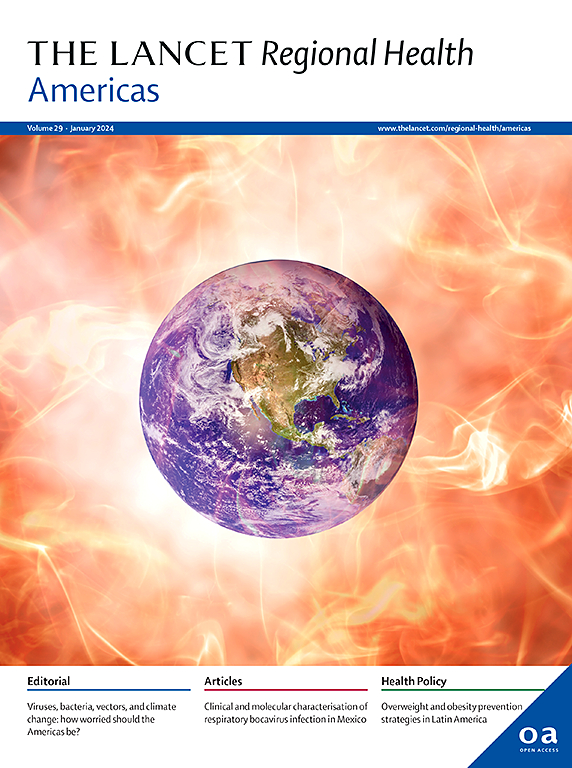Prediction of cardiovascular risk: validation of a non-laboratory and a laboratory-based score in a Brazilian community-based cohort of the PURE study
IF 7
Q1 HEALTH CARE SCIENCES & SERVICES
引用次数: 0
Abstract
Background
Risk scores are essential tools for implementing cardiovascular disease (CVD) prevention. Validating risk scores considering regional diversities and disparities is critical for reducing the burden of CVD on global morbidity and mortality. We aimed to validate two cardiovascular risk scores (laboratory and non-laboratory-based) to predict major adverse cardiovascular events in the Brazilian cohort of the PURE study.
Methods
We validated two risk scores derived from the INTERHEART study, the non-laboratory INTERHEART risk score (NL-IHRS) and the laboratory fasting cholesterol INTERHEART risk score (FC-IHRS) using data from 4623 (urban areas) and 1415 (rural areas) participants without CVD in the Brazilian cohort of the PURE study enrolled in 2004 and 2005 and followed up to September 2021. The endpoint was major cardiovascular events (MACE), defined as the composite of myocardial infarction, stroke, heart failure, or death from cardiovascular causes. We evaluated the model performance of IHRS through c-statistic and calibration methods.
Findings
After a mean follow-up of 8.8 years (range, 0.28–15.1 years), there were 312 cardiovascular events, corresponding to an incidence rate of 0.58% per year (0.56% per year in urban versus 0.64% per year in rural areas). For the NL-IHRS, the c-statistic was 0.69 (95% confidence interval, CI, 0.66–0.72) in the overall cohort, 0.68 (95% CI, 0.64–0.72) in the urban cohort, and 0.72 (95% CI, 0.66–0.78) in the rural cohort. C-statistic values for the recalibrated FC-IHRS were 0.71 (95% CI, 0.67–0.74), 0.71 (95% CI, 0.67–0.75), and 0.70 (95% CI, 0.64–0.76) in the overall, urban, and rural cohorts, respectively.
Interpretation
In this Brazilian community-based prospective cohort, both NL-IHRS and FC-IHRS-based models performed with reasonable discriminative accuracy on the risk estimation of long-term risk of major CVD. A non-laboratory-based CVD risk score may be instrumental in Brazilian communities with limited access to medical resources.
Funding
Population Health Research Institute, Novartis Biociências S.A.
心血管风险预测:巴西PURE研究社区队列中非实验室和实验室评分的验证
背景:风险评分是实施心血管疾病(CVD)预防的重要工具。考虑到区域多样性和差异,验证风险评分对于减轻心血管疾病对全球发病率和死亡率的负担至关重要。我们的目的是验证两种心血管风险评分(实验室和非实验室),以预测PURE研究的巴西队列中的主要不良心血管事件。方法:我们验证了来自INTERHEART研究的两种风险评分,非实验室INTERHEART风险评分(NL-IHRS)和实验室空腹胆固醇INTERHEART风险评分(FC-IHRS),使用的数据来自2004年和2005年PURE研究巴西队列中4623名(城市地区)和1415名(农村地区)无心血管疾病的参与者,随访至2021年9月。终点是主要心血管事件(MACE),定义为心肌梗死、中风、心力衰竭或心血管原因死亡的复合。我们通过c统计和校准方法对IHRS模型的性能进行了评价。研究结果:平均随访8.8年(0.28-15.1年),共发生312例心血管事件,发生率为每年0.58%(城市为每年0.56%,农村为每年0.64%)。对于NL-IHRS,总体队列的c统计量为0.69(95%可信区间CI, 0.66-0.72),城市队列的c统计量为0.68 (95% CI, 0.64-0.72),农村队列的c统计量为0.72 (95% CI, 0.66-0.78)。重新校准的FC-IHRS的c -统计值在总体、城市和农村队列中分别为0.71 (95% CI, 0.67-0.74)、0.71 (95% CI, 0.67-0.75)和0.70 (95% CI, 0.64-0.76)。在这个巴西社区的前瞻性队列中,NL-IHRS和基于fc - ihrs的模型在估计主要心血管疾病长期风险方面具有合理的判别准确性。非实验室基础的心血管疾病风险评分可能有助于获得有限医疗资源的巴西社区。资助人口健康研究所,诺华公司Biociências S.A.
本文章由计算机程序翻译,如有差异,请以英文原文为准。
求助全文
约1分钟内获得全文
求助全文
来源期刊

Lancet Regional Health-Americas
Multiple-
CiteScore
8.00
自引率
0.00%
发文量
0
期刊介绍:
The Lancet Regional Health – Americas, an open-access journal, contributes to The Lancet's global initiative by focusing on health-care quality and access in the Americas. It aims to advance clinical practice and health policy in the region, promoting better health outcomes. The journal publishes high-quality original research advocating change or shedding light on clinical practice and health policy. It welcomes submissions on various regional health topics, including infectious diseases, non-communicable diseases, child and adolescent health, maternal and reproductive health, emergency care, health policy, and health equity.
 求助内容:
求助内容: 应助结果提醒方式:
应助结果提醒方式:


